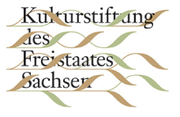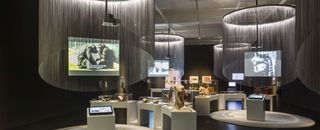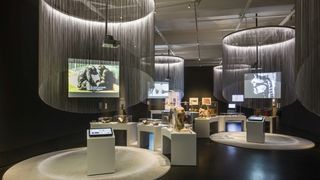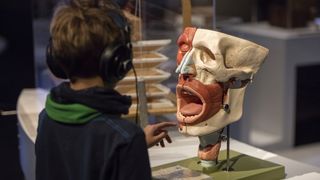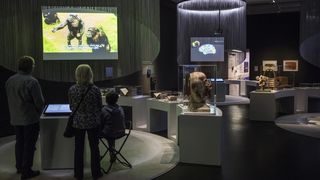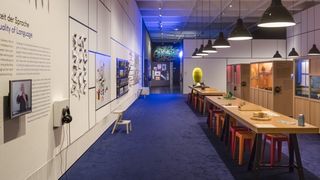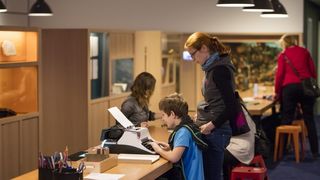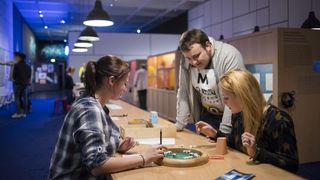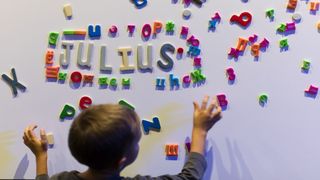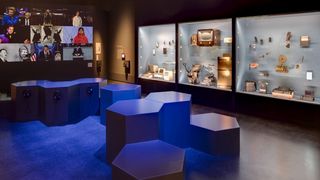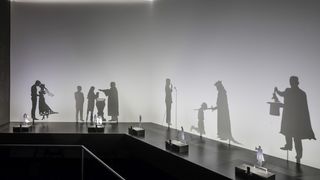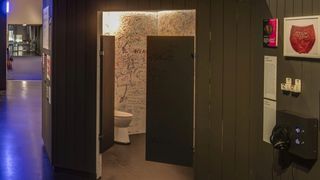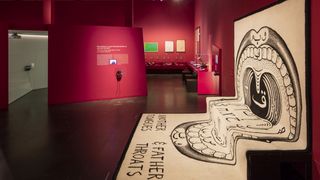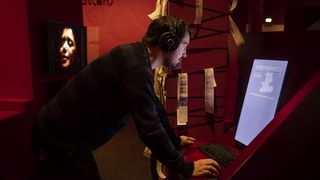Everything but dead letters...
Language, whether it’s spoken, written, signed or sensed, is fundamental to our understanding of ourselves as human beings. This exhibition is all about the complexity and intricacy of language, its creative power, but also its beauty. Based on our everyday experiences it explores the connections between the words we speak, our gestures and mimics, and the written word. Why is it that only we humans possess this complex and versatile instrument? And how can we become more attentive to the language we use?
The exhibition draws the visitor’s attention, at all sorts of levels, to the wealth associated with the many manifestations of language in all the areas of our lives, from literature to youth slang. In our daily interactions with one another we use and shape language, come up with new words, and lose others. The radical changes in our living environments, linked to global technological, cultural and economic trends, are not without impact on language either. That is true in particular of societies where many people look back on a history of migration and where multilingualism tends to be the norm rather than the exception. As the exhibition demonstrates, the essence of language lies first and foremost in its creative adaptability, and on site you will find lots of interactive elements to try this out for yourself.
Artists
Some of the artists, authors and poets being shown in the exhibition are:
Theodor W. Adorno, Halil Altindere, Richard Artschwager, Walter Benjamin, Bas Böttcher, André Breton, Shady Elnoshokaty, Max Ernst, Paule Hammer, Jenny Holzer, Klabund, Dagmara Kraus, Martin Luther, Franz Mon, Herta Müller, Yvonne Rainer, Arnold Schönberg, Nancy Spero, Johann Wolfgang von Goethe, Slavs and Tatars, Bill Viola, Helga Weissova, Erich Kästner, Stefan Zweig
Exhibtion sections
Homo loquens. Speaking of language
Homo loquens is the Latin term for the human being as a speaking animal. Indeed, the ability to speak, whether it’s through sounds or signs, is a defining characteristic of our human condition. It’s also one of the most puzzling, given that there is no concrete evidence of how we actually acquired that ability. The roots of language have fascinated humankind for centuries on end. In the myths that surround the origin of language in many cultures, the ability to speak is seen as god-given.
With the advent of modern science, speech has been studied systematically as a biological and cultural phenomenon.And even if we may never know for certain when, where, and how we came by our ability to speak, the research conducted in a wide array of disciplines does shed light on the complex biological and socio-cultural networks involved in the process of language acquisition
Movements of the Mind. Sense and Sensuality of Language
Language is a fundamental element of our thinking. We use it to give our thoughts a recognisable and communicable shape. Language is always embedded in time and space. Indeed, the ways we think, speak, act, and make sense of the world are inseparably linked with one another. Figures of speech play a huge role in linking the abstract with the concrete. Metaphorical expressions such as “hold onto that thought” or “keep an eye on something” help us to illustrate complex ideas.
Writing for its part lends a visible, material shape to our thoughts. It uncouples language from the speaker, from their voice, gestures and gaze, from hearing and touching. Written laguage helps us to structure and analyse our thoughts. It opens up entirely new opportunities for passing on knowledge. There are no limits to the way we are able to play with language and to the possibilities we have for continually opening up new worlds of ideas. And whenever we read, language rekindles our memories and stimulates our imagination.
Speech Craft. The Magic and Might of Language
Our ability to communicate allows us to convey and understand expectations, messages, wishes, and feelings. But we don’t use language just to describe the world around us. We also use itspecifically as an instrument of power to gain influence and actively shape our surroundings. That’s true on scales both large and small, in politics, and in our private lives. The frameworkwithin which we communicate with one another, and the words we use to do so, tell us a great deal about our values, our sentiments, our views, and our intentions.
Our acts of speaking - be it in everyday conversations or in the public eye - are inseparably linked with our physical body and our surroundings. In the interplay between performativepractices, verbal as well as physical means of expression, they serve as a binding link between the individual and society.
Mother Tongue(s). Belonging and Self-determination
From the moment we are born, each and every one of us becomes part of a language community. So language becomes a mainstay of our personal understanding of ourselves. It is also a social, cultural and political means of creating a sense of belonging to society. Language conventions can give rise to feelings of familiarity and attachment, but also of exclusion and foreignness. Indeed, it is not unusual for these conventions to be part of processes of power politics or to be perceived as stereotypes. They are frequently associated with gender order, manifestations of social strata, or distinctive regional and national traits.
As tightly as the traditions of language are interwoven with our individual and collective identity, the way in which they change and evolve is just as self-evident. The dynamics of cultural encounters, political convictions and technological innovations influences language and alters it. That fact can be unsettling and lead to it being instrumentalised for ideological purposes. The big challenge, when it comes to the living nature of language, is through social consensus to strike the right balance between preservation and innovation, between a sense of belonging and self-determination.
Photo Gallery
Exhibition Data
Team
Curator: Colleen M. Schmitz
Curatorial assistants: Isabel Dzierson, Helene Weidner, Lisa Albrecht
Co-curator contemporary art: Susanne Altmann
Thematic research for installations: Christoph Willmitzer, Kirsten Weining, Theo Thiesmeier, Viktoria Krason, Kathrin Meyer, Roland Meyer
Coordination inclusive exhibits: Anna Diegmann
Consultants: Deutsche Akademie für Sprache und Dichtung: Bernd Busch, Peter Eisenberg, Michael Hagner, Wolfgang Klein; Josh Berson, Bas Böttcher, Brigitte Felderer; Lebenshilfe Sachsen e.V., Chemnitz: Anja Dworski; scouts – Gebärdensprache für Alle, Dresden: Sindy Christoph, Norbert Richter; Ursula Weber, Dieter Wunderlic
Scenography: büroberlin: Julia Neubauer
Graphic design: Little Adén, Berlin
Translation and subtitles: Stephen B. Gynwasser, Christina Oberstebrink, Untertitelwerkstatt Münster GmbH & Co. KG.
AreA
800 sqm
Abtei St. Hildegard, Rüdersheim am Rhein
Ägyptisches Museum und Papyrussammlung, Staatliche Museen zu Berlin, Stiftung Preußischer Kulturbesitz, Berlin
Akademie der Künste, Berlin
Aktion Mensch e.V., Bonn
Allgemeine Linguistik, Computational Linguistics & Phonetics, Universität des Saarlandes, Saarbrücken
Altammo, Fatema, Dresden
Altmann, Friederike, Dresden
Altmann, Susanne, Dresden
Archiv Behindertenbewegung, Marburg
Archiv der emanzipatorischen Behindertenbewegung; MOBILE-Selbstbestimmtes Leben Behinderter e.V. Dortmund
Arnold Schönberg Center, Wien
Association Atelier, André Breton, Paris
Bayerische Staatsbibliothek, München
Bayerischer Rundfunk, Anstalt des öffentlichen Rechts, München
Berlin-Brandenburgische Akademie der Wissenschaften, Berlin
Bibliothek für Bildungsgeschichtliche Forschung des Deutschen Instituts für Internationale Pädagogische Forschung, Berlin
Bieling, Tom, Fakultät Gestaltung / IPP, Universität der Künste Berlin
Bildagentur für Kunst, Kultur und Geschichte, Stiftung Preußischer Kulturbesitz, Berlin
Bill Viola Studio LLC, Signal Hill CA/USA
Blackert, Yvonne, Kleinmachnow
Blümel, Uwe, Berlin
Brackhane, Fabian, Mannheim
British Broadcasting Corporation (BBC), London
Bulang, Matthias, Bautzen
Bundesarchiv, Berlin
Bundesministerium für Bildung und Forschung, Bonn
Burghardt, Anja, Linz
Carlfriedrich Claus-Archiv, Kunstsammlungen Chemnitz
Cassiodor Antiquariat, Gauting
Ching, Luke, Hong Kong, China
Cité des sciences et de l’industrie, Paris
Clarke, Esther, Durham University, Durham
Coppo, Paolo, Dresden
Dakic, Daki?, Düsseldorf
Dale, Cetine, West Hollywood, CA/USA
DDR-Museum, Pirna
Department of Psychology, University of Chicago, Chicago, IL/USA
Depner, Hanno, Institut für Philosophie, Universität Rostock
Deutsche Nationalbibliothek, Frankfurt am Main
Deutsche Welle, Bonn
Deutscher Bundestag, Parlamentsarchiv, Berlin
Deutsches Blinden–Museum e.V., Berlin
Deutsches Buch- und Schriftmuseum, Deutsche Nationalbibliothek, Leipzig
Deutsches Historisches Museum, Berlin
Deutsches Historisches Tonarchiv, Lutherstadt Eisleben
Deutsches Institut für Internationale Pädagogische Forschung, Berlin
Deutsches Literaturarchiv Marbach, Marbach am Neckar
Deutschlandstiftung Integration, Berlin
Die Zeit, Hamburg
Dot Inc., Seoul, Südkorea
Dresdner GSV 1920 e.V., Dresden
Elnoshokaty, Shady, Kairo, Ägypten
Europarat, Straßburg
European Film Gateway, Europeana Foundation, Den Haag
European Sign Language Center, Örebro
Frahm, Jens, Biomedizinische NMR Forschungs GmbH am MPI für biophysikalische Chemie, Göttingen
Fischer, Maria, München
Forschungszentrum Deutscher Sprachatlas, Phillipps-Universität Marburg
Frankfurter Stiftung für Gehörlose und Schwerhörige, Frankfurt am Main
Fricke, Dieter, Flörsheim am Main (Wicker)
Gagosian Gallery, NY/USA
Galerie Francesca Pia, Zürich
Galerie Sandmann, Berlin
Garland, Ellen C., St. Andrews
Gemäldegalerie, Staatliche Museen zu Berlin, Stiftung Preußischer Kulturbesitz, Berlin
Gleichstellungsbüro, Universität Leipzig
Goethe- und Schiller-Archiv, Klassik Stiftung Weimar
GRASSI Museum für Völkerkunde zu Leipzig, Staatliche ethnografische Sammlungen Sachsen, Leipzig
Gruner+Jahr AG Co KG, Hamburg
Gürkan, Ali-Eren, Berlin
GV art, London
Haesler, Sebastian, Department Neurowissenschaften, KU Leuven/B
Hahn, Alexander; Hahn-Wermuth, Inga, Hamburg
Hamburger Stiftung zur Förderung von Wissenschaft und Kultur, Hamburg
Hammer, Paul, Leipzig
Haspel, Raoul, Wien
Haus der Geschichte, Bonn
Heimat- und Geschichtsverein Eningen, Eningen unter Achalm
Herzog August Bibliothek Wolfenbüttel
Hochschularchiv und Kustodie, Hochschule für Bildende Künste Dresden
Holzer, Maria, Berlin
Hübener, Fabienne, München
Institut für Deutsch als Fremdsprachenphilologie, Universität Heidelberg
Institut für Deutsche Gebärdensprache und Kommunikation Gehörloser, Universität Hamburg
Institut für Deutsche Sprache, Mannheim
Institut für Geschichte der Medizin, Medizinische Fakultät Carl Gustav Carus, Technische Universität Dresden
Institut für Kommunikationswissenschaft, Technische Universität Dresden
Institut für Phonetik und Sprachverarbeitung, Ludwig-Maximilians-Universität München
Interessengemeinschaft, Historische Fernmeldetechnik e.V. , Dresden, Telekom-Historik e.V, Bochum
Jenny Holzer Studio, LLC., Hoosick Falls, NY/USA
Jewish National and University Library, Jerusalem
Kagawa University, Takamatsu City, Kagawa Prefecture, Japan
Kampagne Dritte Option, Münster
Karres, Jan, München
Koch, Eva, Kopenhagen
Kolb, Rachel, Atlanta, GA/USA
Kraus-Cavaillès, Dagmara, Berlin/Paris
Anneliese Kusters, Max-Planck-Institut zur Erforschung multireligiöser und multiethnischer Gesellschaften, Göttingen
La Bibliothèque de l’Institut de France, Paris
Lan, Shao, London
Landesamt für Archäologie, Bibliothek, Dresden
Latha County Historical Society, Moscow, ID/USA
Leemann, Adrian, Cambridge
Lehrstuhl für Sprachgebrauch und multimodale Kommunikation, Europa-Universität Viadrina, Frankfurt (Oder)
Lerch, Dieter, Schleswig
Library of Congress, Washington D.C., USA
Little Moving Pictures, San Francisco, CA/USA
Livay, Yvonne, Berlin
Mathematisch-Physikalischer Salon, Staatliche Kunstsammlungen Dresden
Max-Planck-Institut für biophysikalische Chemie, Göttingen
Max-Planck-Institut für evolutionäre Anthropologie, Leipzig
Max-Planck-Institut für Kognitions- und Neurowissenschaften, Leipzig
Max-Planck-Institut für Ornithologie, Seewiesen
Max-Planck-Institut für Psycholinguistik, Njimegen
McLean County Museum of History, Bloomington, IL/USA
Media-Saturn-Holding GmbH, Ingolstadt
MediClin Robert Janker Klinik, Bonn
Metropolitan Police, Crime Museum, London
Militärhistorisches Museum der Bundeswehr, Dresden
mOcean OTonVerlag OhG, München
Mon, Franz, Frankfurt am Main
Mühlenberend, Helena, Weimar
Müller, Herta, Berlin
Musée de l’école de Bothoa, Saint-Nicolas-du-Pélem
Museu d´Art Contemporani de Barcelona, Barcelona
Museum für Kunst und Gewerbe, Hamburg
Museum für Musikinstrumente der Universität Leipzig
Museum für Sächsische Volkskunst, Staatliche Kunstsammlungen Dresden
Museum für Sepulkralkultur, Arbeitsgemeinschaft Friedhof und Denkmal e.V., Kassel
Museum für Völkerkunde Dresden, Staatliche Ethnographische Sammlungen, Dresden
Museum Sztuki Nowoczesnej w Warszawie, Warschau
Neubauer, Julia, Berlin
Neues Deutschland Druckerei und Verlag GmbH, Berlin
Ni, Dawei, Winterthur
Niedersächsische Staats- und Universitätsbibliothek, Göttingen
Niedersächsischer Verein zur Förderung von Theresienstadt / Terezín e. V., Küsten
Ogens, Matt, Los Angeles, CA/USA
Österreichische Akademie der Wissenschaften, Phonogrammarchiv, Wien
Pepperberg Lab, Cambridge, Massachusetts/USA
Pilot, Istanbul, Türkei
Prieto, Pilar, Bosch, Laura, Grupo de Estudios de Prosodia, Universitat Pompeu Fabra; Laboratorio de Atención, Percepción y Adquisición del Lenguaje, de la Universitat de Barcelona; mit freundlicher Unterstützung von RecerCaixa
Ploog, Helmut, Baldham bei München
Polizeidirektion Dresden
Projekt Gutenberg-DE, Hamburg
queerblick e.V., Dortmund
Richter, Norbert, Dresden
Robert-Havemann-Gesellschaft e.V., Berlin
ROGERS, COLERIDGE & WHITE LTD, London
Roemer- und Pelizaeus-Museum, Hildesheim
Sächsische Landesbibliothek – Staats- und Universitätsbibliothek, Dresden
Sächsische Landesschule für Hörgeschädigte Leipzig, Förderzentrum Samuel Heinicke, Leipzig
Scharf, Lothar, Mühlhausen
Scharff, Constance, Institut für Biologie, Freie Universität Berlin
Schönherr, Hans-Jörg, Dresden
Schwules Museum*, Berlin
Seminar für Sprechwissenschaften und Phonetik, Martin-Luther-Universität Halle-Wittenberg
Skulpturensammlung, Staatliche Kunstsammlungen Dresden
Slavs and Tatars Studio, Berlin
Smith, Zadie, London
SMITH/STEWART, Glasgow
Sofronieva, Tzveta, Berlin
Solidaritätsdienst International e.V., Berlin
Sorbisches Kulturarchiv am Sorbischen Institut e.V. Bautzen
Sorbisches Zentralbibliothek am Sorbischen Institut Bautzen
Sorbisches Museum/ Serbski muzej, Bautzen
SPIEGEL ONLINE GmbH, Hamburg
Sprengel Museum Hannover
Sprüth Magers, Berlin/London
Staatsbibliothek zu Berlin, Stiftung Preußischer Kulturbesitz, Berlin
Stadtbibliothek Chemnitz
Stidworthy, Imogen, Amsterdam
Steinbach, Markus, Mani, Nivedita, Onea, Edgar, XPrag, Göttingen
Stiftung Carlfriedrich Claus-Archiv, Kunstsammlungen Chemnitz
Stiftung Deutsches Hygiene-Museum, Dresden
Stiftung Deutsches Rundfunkarchiv, Potsdam-Babelsberg
Stuttering Therapy, Lexington, MA/USA
Swiss Life Deutschland Holding GmbH, Hannover
Tammo, Fatema, Dresden
Technische Sammlungen Dresden, Museen der Stadt Dresden
Tesfu, Tarik, Berlin
The Ape Cognition and Conservation Initiative, Des Moines, IA/USA
The School of the Art Institute of Chicago, IL/USA
Theodore Roosevelt Center, Dickinson State University, Dickinson, ND/USA
Tierstimmenarchiv, Museum für Naturkunde, Humboldt-Universität zu Berlin
Topolinski, Sascha, Department Psychologie, Universität zu Köln
Universität Bielefeld
Universität Stuttgart
Universität Wien
Universität- und Forschungsbibliothek Erfurt / Gotha
Universitätsbibliothek der Humboldt-Universität zu Berlin
Universitätsbibliothek Heidelberg
Universitätsbibliothek Leipzig
Universitätsbibliothek Tübingen
Universitätsklinikum Carl Gustav Carus, Dresden
University of British Columbia, Vancouver, Kanada
University of Edinburgh
Váša, Petr, Brno
Vassas, Odile und Hase, Norbert, Dresden
Vorderasiatisches Museum, Staatliche Museen zu Berlin, Stiftung Preußischer Kulturbesitz, Berlin
Wächter, Matthias, Dresden
Walter Benjamin-Archiv, Akademie der Künste, Berlin
Weibernetz e.V., Kassel
Westdeutscher Rundfunk (WDR), Köln
Wiendl, Christian, Dresden
Wirtschaftswundermuseum.de, Rheinberg
Wisconsin Historical Society, Madison, WI/USA
Wolfsonian-FIU, Miami Beach, FL/USA
Zeidler, Kraupa-Tuskany, Berlin
Zentralarchiv zur Erforschung der Geschichte der Juden in Deutschland, Heidelberg
Zentralbibliothek Zürich
Zentrum für populäre Kultur und Musik, Universität Freiburg
Zischler, Hanns, Berlin
Zürcher Hochschule der Künste / Museum für Gestaltung Zürich, Plakatsammlung, Zürich
Zweites Deutsches Fernsehen (ZDF), Mainz
Supported by

